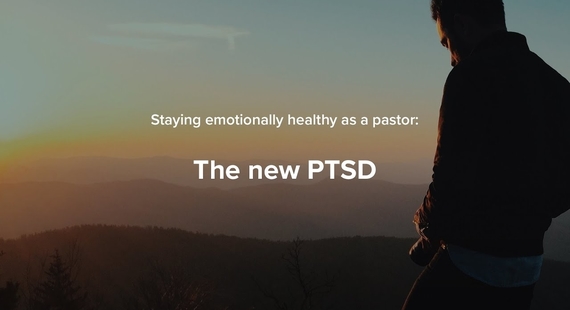I can’t remember a time in my life when I felt like I was just going through the motions but knew there was something much deeper going on underneath the surface. I’m experiencing feelings that I’ve never felt before, and I’m not sure what they are. I feel unsettled most of the time, but I can’t quite place my finger on it in a way that is easy to describe. I’m only comforted by the fact that most of the friends and associates I speak with are experiencing the same or similar feelings.
Welcome to the new PTSD: Present Traumatic Soul Disorder. While I in no way want to minimize the traditional PTSD that many suffer returning from war or the result of other intense traumatic experiences in life, I believe we’re encountering something new that we don’t even have language for.
All we can say for sure is that it is “present,” meaning that we haven’t finished going through the process yet. It is “traumatic,” causing many to experience more profound senses of loss, fear, anxiety, depression and other feelings than we’ve ever experienced in a compacted period. Our “souls” know that something is wrong, even though we can’t quite put our finger on how to identify or describe it. And we feel “disordered” in a way that we’ve never felt.
What realities are disordering our souls?
Several times in the Psalms, the writer talks to the soul as if it is a person: “Why, my soul, are you downcast? Why so disturbed within me?” (Psalm 42 and 43). Great question! These are in Psalms of Lament, where the writer is usually crying out to God in fear or confusion or frustration or anger. That sounds a lot like a necessary practice for the times we’re living in.
What are we experiencing? I don’t claim to be an expert on any of these things, but I’m reminded of Max De Pree, who said that “the first responsibility of a leader is to define reality.” In my attempt to define both my reality and the reality of the leaders I work with every day, I sat down to write out a list of what I’m hearing, seeing and experiencing. I know many traumatic events are impacting our souls. But the list I brainstormed had over two dozen “realities” we’re facing. Here’s a short list of what I came up with:
- Loss/sadness/grief/mourning

- Anticipatory grief for what we fear might be coming
- Vicarious trauma for others who are suffering

- Fear of the unknown and loss of control
- Decision fatigue
- Conflicting expectations

- Theological questioning
- Loss of familiar structures
- Increased congregational polarization

- Financial strain
- Uncertainty and transition
- Discontinuous change
- Family pressures
- Health risks
- Vocational disruption
If you’re anything like me, you’ve probably found yourself wishing quietly (or maybe even saying out loud): “I want things to go back to normal!” I don’t like to say this, but I believe we’re not going back. “Normal” has changed. There will be a “new normal,” even though we don’t know what that looks or feels like yet.
Outer journey + inner journey
Usually, when we go through a difficult season, it is either a challenge from culture, society or the external world around us (what I’m calling our “outer journey”) or stress that comes from personal loss, pain or suffering (what I’m calling our “inner journey”). In 2020, we’re being attacked on both fronts — both externally and internally. It seems that there is incredible pressure from both outside and inside. How are the pressures from our “outer journey” intersecting with our “inner journey?”
The challenge to our “outer journey” might best be described as “liminality.” The liminality concept comes from the word meaning “threshold” and describes the state of transition from one stage to the next. It’s when you’re in between, you can’t go back, but have no idea what it might mean to go forward. Can you see how many of the realities just mentioned make this true?
The challenge to our “inner journey” might best be described as “trauma.” Trauma is the experience of severe psychological distress following any terrible or life-threatening event. Sound familiar?
When both of these challenges collide, we’re left with a sense of fragmented languishing. Nothing feels right. Everything is out of place. We go through our days looking for something that might feel normal. But it’s incredibly hard, if not impossible, to find.
Because our normal structures are being attacked, our human tendency is to resist and fight back. Our adrenaline rises to the occasion, and our sense of goodness and justice wants to exert itself in any way possible.
I was never trained in martial arts, but my son has a black belt in karate. One principle I remember from paying for eight years of lessons is the best thing you can do when being attacked is to use the attacking energy to your advantage. If you outwardly try to resist and fight back, you’ll be at a disadvantage. But if you cooperate with the attacking reality, you can use that energy in the most helpful way possible.
Another analogy I’ve learned from the sports of snowboarding and surfing. You can’t fight a wave or three feet of fresh powder. You have to discover its energy and allow yourself to ride that matter in a way that will enable you to use it for your intended purpose. When you learn to ride snow or water in this way, it actually becomes fun!
To return to our journey metaphor again, we need to put the outer journey in perspective and institute practices that will bring healing into our inner journey. When we move in this direction of putting the liminality into perspective and work practices that bring healing to our inner trauma, we’ll begin to experience holistic flourishing instead of fragmented languishing.
Steps to deal with what our souls are experiencing
Instead of resisting or fighting what is happening around us and in us, we can accept and cooperate with it so that transformation can truly take place. I believe there are a few steps we can take that will move this process along:
1. Practice listening discernment
My natural tendency is to fix a problem as soon as possible. This pushes me toward making quick-fix decisions, which are rarely helpful as they lack the discernment that comes from deep listening and observation. I’d encourage you to face each challenge with a posture of humble listening. Ask new and different questions than you might be used to. Expose yourself to the way others are thinking about the situation. Maybe even others who you might not normally agree with.
2. Weigh all options
In addition to wanting to fix things quickly, many of us tend to be people-pleasers, which always affects the way we lead. In the sermon on the plain, Jesus exhorts, “Woe to you when everyone speaks well of you” (Luke 6:26), reminding us that many of the things we say or the decisions we make might tick people off. Sometimes the only way to address the polarization that many of us are experiencing as leaders is to take a stand for the common good and don’t shy away from clearly articulating the options and their consequences.
3. Identify new opportunities
Leaders are facing some of the most difficult challenges of our lifetimes. But we must not forget that with every challenge comes a new opportunity that we might have never seen without the challenge.
One of the most significant opportunities sitting right in front of us is to encourage people to “be the church” in their neighborhoods. Most of us have experienced small groups and possibly even a home/organic church. But this is different. We can live out both the Great Commission and the Great Commandment in more relational ways than ever.
Second, we are being given an incredible opportunity to love those who are different than us, engage in biblical social justice in a way that the prophet Micah would be proud of (Micah 6:8), and get outside our boxes and comfort zones in a way that only a pandemic combined with an uprising for racial justice could produce.
4. Evaluate potential obstacles
As with any new growth, movement or goal, there will always be obstacles. We can’t ignore these. But we can’t allow them to get in the way either. I suggest you write them out, brainstorm them as a team and discuss how you hope to engage each one. This is an exercise in resilience.
5. Take a next step
Most of us are feeling totally overwhelmed. It’s so hard to know what to do next. That’s why I think the best wisdom is to take the next faithful step. It might even be a baby step. As they say, Rome wasn’t built in a day, and neither will God’s kingdom expressions on earth adapt all at once. But there is one thing you can do today. And maybe another thing you can do tomorrow. And those incremental changes will make a huge difference over the long haul.
In the midst of this new PTSD, please remember that you are called to make a difference in this world. Give yourself a lot of grace. Surround yourself with wise, affirming relationships. Don’t be afraid to act justly, love mercy and walk humbly. Our souls are incredibly resilient and can once again flourish on the other side of the new normal.
More resources to help you
To support you in implementing changes like those discussed in this article, Dr. Michael Bischof and the SOULeader Resources team are available to assist you, your team or your church/organization with personal, team or organizational coaching. To learn more, send them an email, call 949.829.0625 or visit their website.
Converge’s Compass pastor assessment will help you evaluate your ministry and enable you to face challenges, move forward and increase fruitfulness. Learn more.
If you’re a pastor and you need someone to talk to, contact us.
Other Staying Emotionally Healthy as a Pastor videos
- Only human in a pandemic
- The art of self-care
- Leading in the midst of the storm
- Leaders that last
- When you’re tired and worn
© 2020 Michael G. Bischof, all rights reserved



